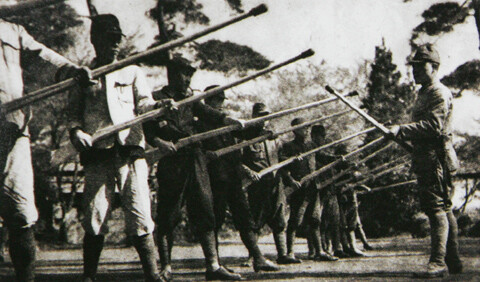hankyoreh
Links to other country sites 다른 나라 사이트 링크
Victims of forced conscription by Japanese military still seeking compensation

By Gil Yun-hyung, staff reporter
“The government hasn’t been helping the victims of forcibly conscripted as soldiers by Japan. If anything, they’re making things worse by getting in the way of our efforts.”
The despair was evident in the voice of Moon Yong-sik, 53, as he spoke to the Hankyoreh on Aug. 20. His late father Moon Soon-nam was born in 1924 and later conscripted by the Japanese army to work in Siberia. At the time, Korea was under Japanese colonial occupation. The elder Moon was stationed with the Kwantung Army in Manchuria, but ended up as a prisoner-of-war when the Soviet Union entered the war. The war ended, but he was forced to stay. The Soviets decided to make up for their own labor shortfall by sending 600,000 Japanese and Korean POWs to toil for years in places like Siberia.
When the Democratic Party of Japan (DJP) was in power, the younger Moon thought there might a chance of receiving compensation for his father’s suffering. Now that Prime Minister Shinzo Abe and the Liberal Democratic Party are in power, it’s a different story. Feeling frustrated, Moon send a letter to the South Korean Ministry of Foreign Affairs last May to ask for its opinion and demand that the government work harder on the Siberian detainee issue. The ministry responded twice, on June 12 and Aug. 14. Both times it said the right of detainees who were repatriated to South Korea prior to the 1965 Treaty on Basic Relations between Japan and Korea to claim damages from Japan was viewed as having been settled with that agreement. A private committee formed after the text of the treaty was disclosed in 2005 had cited only three issues as not having been included in its scope: so-called “comfort women” drafted as sex slaves to the Japanese military, Koreans still living on Sakhalin Island, and atomic bomb survivors. Everything else had been settled with the 1965 treaty, the ministry said, and there was no longer any basis to ask Tokyo for anything.
The ministry’s position was several steps back from the views of Japanese politicians and civil society who have been working for decades to resolve the issue. The late DPJ Councilor Azuma Konno, someone who fought for years for a resolution, told the Hankyoreh in March 2009 that the Japanese government could not use the agreement as a basic for denying compensation to individual Korean detainees because their detention in Siberia took place after the war was over. He also declared that he would continue “working legislatively so that Koreans will be able to receive compensation.”
In June 2010, when the DPJ was in power, the Japanese government made special payouts ranging between 250,000 and 1.5 million yen (US$2,560-15,400) per person as part of a restitution measure for Japanese detainees in Siberia. Originally, people with Korean and Taiwanese nationality were also to be included, but the legislation was first enacted for Japanese detainees as part of a strategy aimed at getting a recalcitrant LDP on board for the law before expanding its scope later on.
A senior official with the South Korean Ministry of Foreign Affairs said the administration was examining the legal possibilities on the issue, but added on condition of anonymity, “nothing has yet changed in its existing position.”
A source who has spent many years researching the conscription issue called the response “baffling.”
“The South Korean government should at the very least be demanding that Japan take responsibility, but instead it’s interpreting the law in a way that is retrograde even by the standards of Japanese politicians,” the source said on condition of anonymity.
“What responsible action is the Japanese government going to take when the South Korea government has declared that Japan‘s not at fault on this issue?”
Please direct questions or comments to [english@hani.co.kr]

Editorial・opinion
![[Editorial] Does Yoon think the Korean public is wrong? [Editorial] Does Yoon think the Korean public is wrong?](https://flexible.img.hani.co.kr/flexible/normal/500/300/imgdb/original/2024/0417/8517133419684774.jpg) [Editorial] Does Yoon think the Korean public is wrong?
[Editorial] Does Yoon think the Korean public is wrong?![[Editorial] As it bolsters its alliance with US, Japan must be accountable for past [Editorial] As it bolsters its alliance with US, Japan must be accountable for past](https://flexible.img.hani.co.kr/flexible/normal/500/300/imgdb/original/2024/0417/6817133413968321.jpg) [Editorial] As it bolsters its alliance with US, Japan must be accountable for past
[Editorial] As it bolsters its alliance with US, Japan must be accountable for past- [Guest essay] Amending the Constitution is Yoon’s key to leaving office in public’s good graces
- [Editorial] 10 years on, lessons of Sewol tragedy must never be forgotten
- [Column] A death blow to Korea’s prosecutor politics
- [Correspondent’s column] The US and the end of Japanese pacifism
- [Guest essay] How Korea turned its trainee doctors into monsters
- [Guest essay] As someone who helped forge Seoul-Moscow ties, their status today troubles me
- [Editorial] Koreans sent a loud and clear message to Yoon
- [Column] In Korea’s midterm elections, it’s time for accountability
Most viewed articles
- 1‘Right direction’: After judgment day from voters, Yoon shrugs off calls for change
- 2[Editorial] Does Yoon think the Korean public is wrong?
- 3Strong dollar isn’t all that’s pushing won exchange rate into to 1,400 range
- 4Where Sewol sank 10 years ago, a sea of tears as parents mourn lost children
- 5Japan officially says compensation of Korean forced laborers isn’t its responsibility
- 6[Editorial] As it bolsters its alliance with US, Japan must be accountable for past
- 7[News analysis] Watershed augmentation of US-Japan alliance to put Korea’s diplomacy to the test
- 8Korea ranks among 10 countries going backward on coal power, report shows
- 9Faith in the power of memory: Why these teens carry yellow ribbons for Sewol
- 10[Guest essay] Amending the Constitution is Yoon’s key to leaving office in public’s good graces